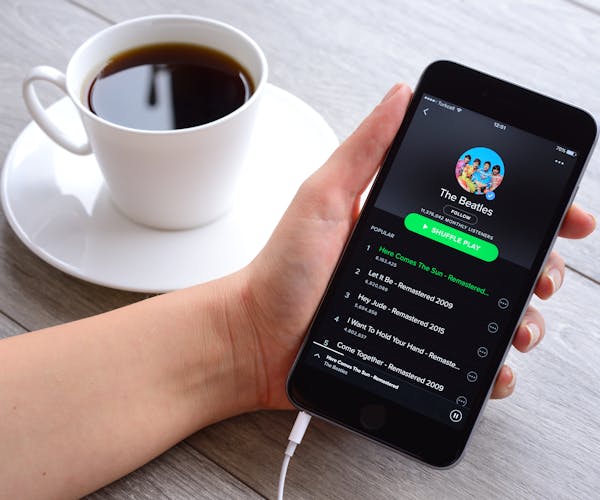You can't play them in newer cars. You can't use them with most laptop computers. And unless you own a Sony Discman that somehow still works and you don't mind getting strange looks in public, you can't go for a walk or run with them nowadays.
It's a conundrum many music fans are facing as they clean house while under coronavirus quarantine: What should I do with these boxes/crates/shelves of old CDs that I haven't listened to in five years or more?
Those old compact discs you loaded up on at $15 a pop are now worth pennies on the Clinton administration dollar, thanks to a double-whammy change in consumers' listening habits.
First, advances in MP3s and now music-streaming services such as Spotify made it possible to carry tens of thousands of albums in the palm of your hand. Conversely, many fans have reverted back to vinyl as their preferred format for "physical" music.
Sales of new CDs have plummeted by about 90% over the past decade. Last year saw a particularly sharp decline, with a drop by more than 25% from 2018 — about the same increase that streaming numbers saw in the same time frame, now over a trillion per year.
Even those of us who've stuck up for CDs in the past have to admit that the thousands in our basement have grown superfluous. And cumbersome. Why dig for that Alanis Morissette or House of Pain CD when you can easily find it on your phone?
It's always possible to rip your CDs onto a hard drive to save them in MP3 format before you get rid of them, but that also seems to be an increasingly outdated mode of listening. Here are options for handling them.
Sell them to stores: Surprisingly, many record shops still buy and sell used CDs, as does Half-Price Books. The Electric Fetus' general manager, Bob Fuchs, said used sales have held strong even while new CDs have tanked, because "they're so cheap now, you can go home with four or five new albums for about $20."
Still, Fuchs acknowledged that his store only pays about 25 cents per disc ("up to $1 for something really good"), and given the datedness of many people's CD collections, the staff is very choosy about the shape they're in.
"They can't look like you've been eating off them for 20 years," he said.
Sell them in bulk online: Linda and Bill Wareham of St. Paul recently came up with a rather tedious but ultimately worthwhile solution: After selling some in person at Cheapo Records, they sold more of their CDs in bulk to the website Decluttr.com. The site, which resells via Amazon, requires you to scan or type in the bar code of each CD but pays about $1 to $2 per disc (DVDs, too).
"To be honest, I don't feel like I was cheated," Bill Wareham said. "They were out of my house and I was making a little money off them."
If you have a particularly deep and rarefied collection, it's maybe worth seeking out a collector online or going to eBay to try to sell them all in one swoop.
Sell them one by one: If you really have time on your hands and like visiting the post office, you could try selling them yourself via Discogs, Musicstack or eBay, which could amount to a few bucks per CD; the ones that do sell, that is. Of course, a good ol' garage sale works in this case, too, but even your aunt who goes out "saling" every Saturday has probably turned to streaming her Streisand albums.
Donate them: Goodwill still sells CDs and DVDs and collects them at its drop-off locations. Many libraries — including those in Hennepin and Ramsey counties — also take them and will either stock them for checkout or sell them at sales or their used stores. (Obviously, these places are currently closed, and all donations have to wait until the quarantine is lifted.)
Recycle them: Aside from the paper-sleeve inserts, plastic CD cases and the discs themselves aren't permitted in conventional curbside recycling, only out-of-the-way "technology recycling" sites such as Tech Dump in St. Paul or Green Lights Recycling in Blaine. The website Greendesk.com offers packing and shipping options, but it's pricey (about $15 plus shipping for a 25-pound package).
One free recycling option: Use the shiny discs for arts-and-craft projects, such as mobiles or collages.
Hang onto them: You never know, there could be a resurgence in popularity for CDs in the coming decade or two like there was for vinyl. There's even been a niche market for cassettes among hipster kids in recent years (yeah, go figure!).
Also, given the fight for better royalty payments to artists from Spotify, etc., there could be a time when albums are not as widely available or affordable on streaming sites. But for now all signs point otherwise.
Chris Riemenschneider • 612-673-4658
@ChrisRstrib
